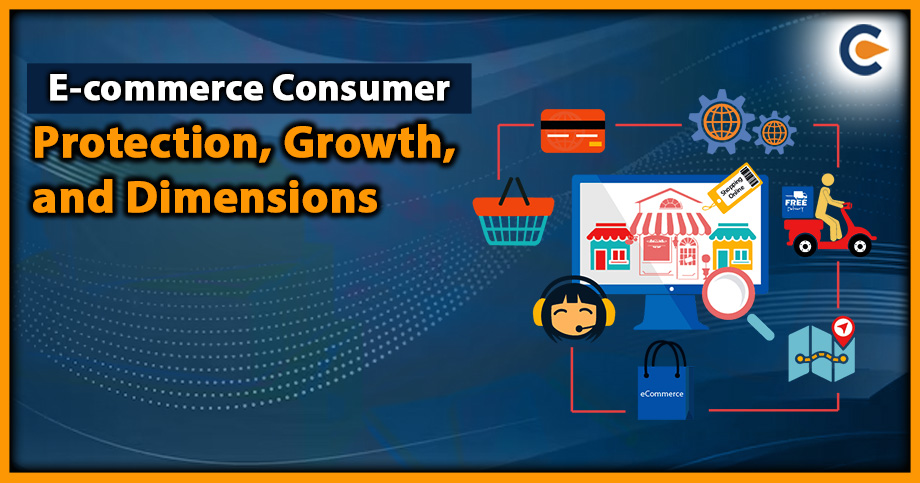E-commerce or electronic commerce, refers to the buying & selling of goods & services over the Internet. It includes a range of commercial activities like online shopping, electronic payments, online auctions & Internet banking. It has become increasingly popular in recent years, driven by the growth of the Internet & the increasing use of smartphones & other mobile devices. This has revolutionized the way businesses operate, allowing them to reach customers around the globe & enabling consumers to shop online from the comfort of their homes.
Consumer Protections in E-commerce
Consumer protections in E-commerce are designed to ensure that online shoppers are safe from fraud, deception, and unfair business practices. These protections include:
- Secure Payment Methods
Online shoppers should be able to make payments using secure methods, such as credit card payments, PayPal, or other reputable payment gateways. This helps to protect consumers from fraudulent activities.
- Privacy Protection
Online shoppers should be able to trust that their personal details is kept safe & secure. This includes protection from identity theft, spam, and phishing scams.
- Returns and Refunds Policies
Consumers should have clear and easy-to-understand policies for returning items and obtaining refunds. This includes information on the return process, the timeframe for returns, and the conditions for refunds.
- Consumer Reviews
Online shoppers should have access to reliable and authentic customer reviews. These reviews can help consumers make informed decisions about products and services.
Consumer Protection Laws
Legal protection is an essential component of Ecommerce consumer protection. It ensures that consumers are protected from fraud, scams, and other unfair business practices when shopping online.
Consumer protection laws are introduced to safeguard consumers from unfair and deceptive business practices. These laws are typically enforced by government agencies like the Federal Trade Commission (FTC) in the United States. Some examples of consumer protection laws include:
- The Consumer Protection Act
This law provides consumers with legal recourse if they have been victims of deceptive or unfair business practices.
- The Fair Credit Reporting Act
This law regulates the collection, dissemination, and use of consumer credit information.
- The Electronic Fund Transfer Act
This law provides protections for consumers who use electronic payment systems, such as debit cards and electronic checks.
- The Children’s Online Privacy Protection Act
This law regulates the collection of personal details from children under the age of 13.
Contract Law
Contract law is also important for Ecommerce consumers. When consumers make a purchase online, they enter into a contract with the seller. The terms of the contract are typically spelled out in the seller’s terms and conditions. Some important considerations for E-commerce consumers when it comes to contract law include:
- Clear and Conspicuous Terms and Conditions:
The terms & conditions of the contract should be clear and easy to understand. Consumers should be able to easily find and read the terms before making a purchase.
- Unfair Contract Terms:
Contract terms that are unfair or deceptive are not enforceable under the law.
- Consumer Consent:
Consumers must agree to the terms and conditions of the contract before making a purchase.
Intellectual Property Law
Intellectual property law is also relevant for E-commerce consumers. Intellectual Property (IP) refers to creations of the mind, such as inventions, artistic works, and symbols. Some important considerations for E-commerce consumers when it comes to intellectual property law include:
- Trademark Infringement:
Consumers should be aware of trademark infringement when shopping online. This occurs when a seller uses a trademarked name or logo without permission.
- Copyright Infringement:
Consumers should also be aware of copyright infringement when shopping online. This occurs when a seller uses copyrighted material, such as images or text, without permission.
- Counterfeit Products:
Consumers should be aware of counterfeit products when shopping online. Counterfeit products are fake versions of branded products and can be dangerous or harmful.
Growth of E-Commerce
E-commerce has grown significantly over the past decade, with more & more consumers turning to online shopping for their everyday needs. The growth of E-commerce has been driven by several factors, including:
- Convenience:
Online shopping provides customers with the ability to shop from anywhere, at any time. This convenience has made E-commerce a popular option for busy consumers who don’t have time to visit physical stores.
- Greater Product Variety:
Online shopping offers consumers access to a wider range of products than they might find in a physical store. This means that consumers can find exactly what they need, even if it’s not available locally.
- Lower Prices:
Online retailers often offer lower prices than their brick-and-mortar counterparts. This is because online retailers don’t have the same overhead costs associated with running physical stores.
- Personalization:
E-commerce platforms use data analytics to personalize shopping experiences for consumers. This means that consumers are presented with products and services that are tailored to their preferences and needs.
Dimensions of E-Commerce Consumer Protections
E-commerce refers to the buying & selling of goods and services over the Internet. It has become popular in recent years due to recent advancements in technology & changing consumer behavior. E-commerce has several dimensions, each of which plays a vital role in the success of an E-commerce business.
There are several dimensions of E-commerce consumer protections, including:
- Legal Protections:
These include consumer protection laws, such as the Consumer Protection Act[1], which provide legal recourse for consumers who have been victims of fraudulent activities.
- Technical Protections:
These include security measures, such as encryption and secure payment gateways, which protect consumers from online fraud and identity theft.
- Ethical Protections:
These include the ethical practices of online retailers, such as transparency, honesty, and fair business practices.
- Social Protections:
These include the protection of vulnerable consumers, such as children and the elderly, from online scams and exploitation.
B2B E-Commerce
Business-to-business (B2B) E-commerce refers to the buying and selling of goods and services between businesses over the Internet. B2B E-commerce can involve large quantities of goods or services and is typically done through a business-to-business E-commerce platform. B2B E-commerce has grown significantly in recent years, with many businesses turning to online platforms to streamline their procurement processes.
B2C E-Commerce
Business-to-consumer (B2C) E-commerce refers to the buying & selling of goods and services between businesses and individual consumers over the Internet. B2C E-commerce can involve a wide range of products, from clothing and electronics to groceries and household items. B2C E-commerce is the most common form of E-commerce and is often done through online marketplaces or individual business websites.
C2C E-Commerce
Consumer-to-consumer (C2C) E-commerce refers to the buying and selling of goods and services between individual consumers over the Internet. C2C E-commerce is typically done through online marketplaces that connect buyers and sellers. Popular C2C E-commerce platforms include eBay, Craigslist, and Facebook Marketplace.
Mobile Commerce
Mobile commerce, or m-commerce, refers to the buying and selling of goods and services through mobile devices, such as smartphones and tablets. M-commerce has grown significantly in recent years due to the increasing use of mobile devices and the convenience they offer. Many E-commerce businesses have developed mobile apps or optimized their websites for mobile devices to take advantage of this trend.
Social Commerce
Social commerce refers to the buying and selling of goods and services through social media platforms. Social commerce has grown in popularity in recent years as social media platforms like Facebook and Instagram have developed E-commerce features. Social commerce allows businesses to reach consumers where they spend a vital amount of time online and can help to increase brand awareness and sales.
Cross-Border E-Commerce
Cross-border E-commerce refers to the buying & selling of goods and services between businesses and consumers in different countries. Cross-border E-commerce has significantly grown in recent years due to advancements in logistics and the increasing ease of international transactions. Cross-border E-commerce presents significant opportunities for businesses to reach new markets and increase their customer base.
Conclusion
Consumer protections are essential to the growth and sustainability of E-commerce. By providing consumers with secure payment methods, privacy protection, clear returns and refunds policies, and reliable customer reviews, online retailers can build trust and loyalty with their customers. As E-commerce continues to grow, it is important that consumer protections keep pace with the changing landscape of online shopping.
Read Our Article: Comprehensive Guide On Consumer Protection Rules On E-Commerce, 2020











